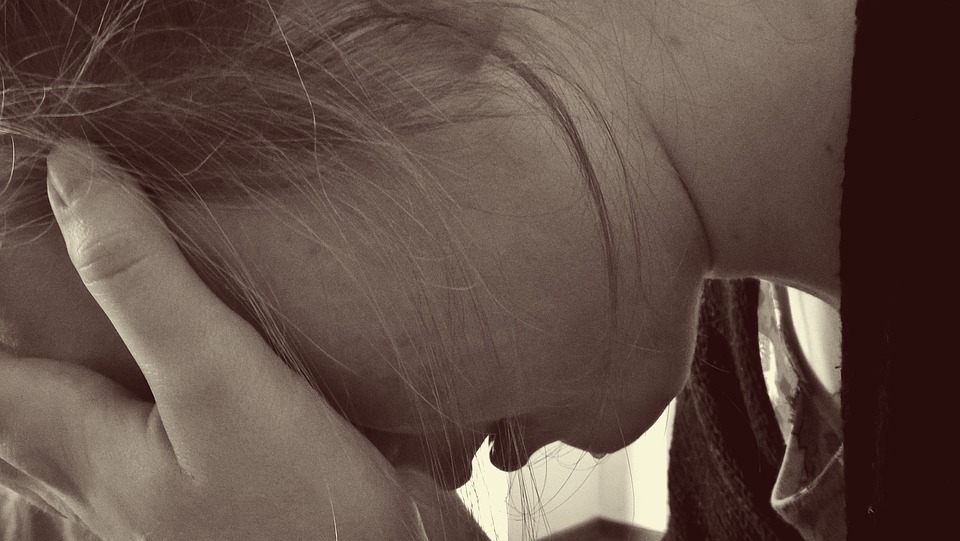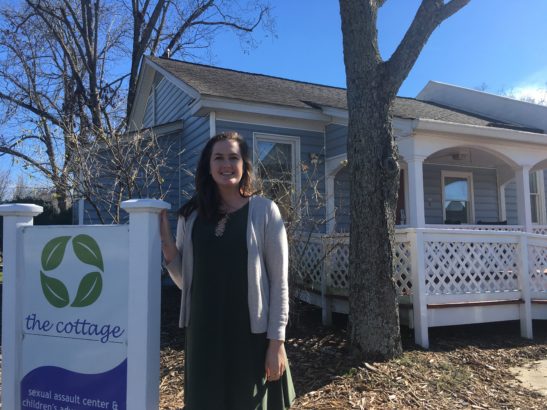Sexual Assault And PTSD: What’s Being Done For Survivors

A study by the National Violence Against Women Prevention Center at the Medical University of South Carolina found that almost one-third of all rape victims developed PTSD at some point during their lives
Pixabay Images
“I used to have nightmares actually, about a shadowy figure that would stand over my bed,” said M, “and it was shaped like my assailant.”
M, a college student in Georgia, is a survivor of sexual assault. She has experienced PTSD since the attack a year ago. She has been taking medication and going to therapy to help with the symptoms.
Post-traumatic stress disorder (PTSD) has been discussed for decades as a problem for war veterans. But it is also one of the most common psychological effects seen in survivors of sexual assault.
According to the National Center for PTSD, symptoms include repeated thoughts of the assault, memories and nightmares, and attempts to avoid thoughts, feelings and situations related to the assault. Examples of this include difficulty sleeping and concentrating, jumpiness and irritability.
A study by the National Violence Against Women Prevention Center at the Medical University of South Carolina found that almost one-third of all rape victims developed PTSD at some point during their lives. Rape victims were 6.2 times more likely to develop the condition than non-victims of crime. The center says that if 13 percent of American women have been raped, and 31 percent of these women have developed PTSD, then 3.8 million adult American women have rape-related PTSD.
“When my therapist first told me I had PTSD, I thought she was nuts,” said Susan Lee, who lives in New Jersey. “I was like, ‘You’re out of your mind, the only people that get PTSD are like in the military, they’ve been shot at and stuff.’ ”
Lee is a survivor of sexual assault. After around 30 years of not dealing with her assault, she went to therapy. It was there that she was diagnosed with PTSD and started her journey of healing.
Lee and M are just two of the many survivors who suffer from PTSD and its related symptoms.
Lee now works as a board moderator for Pandora’s Project, a nonprofit online organization offering peer support, information and resources to anyone who has been affected by sexual violence. This is done using tools such as message boards and chat rooms.
“I could be anywhere, I could be walking down the street,” Lee said. “I heard a laugh or some man walked past me and smelled like one of them, it’s visceral, it brings it all back to you.”
Music can be triggering for M. Popular music that degrades women is one of the things that troubles her most.
But sometimes it’s not the content of a song but the memories linked to it. “There’s songs that my rapist and I used to listen to,” she said, “and I still have trouble listening to them in the same way.”
This is just one of the societal factors that can be triggering for survivors.
Coping with PTSD was hard for Lee. The first time she talked about her assault was when she went to therapy for all the “difficult symptoms I was dealing with at the time.”
Lee credits her therapist with helping save her life. She, like some other survivors, had started to self-medicate to deal with her trauma. Luckily, she pulled herself out of this spiral with the therapist’s help.
“Being attacked in such a personal way, such an intimate way, it touches every aspect of your life,” she said, “and you have to learn how to manage that.”
Therapy helped her to do this. Although it was a financial burden, it was worth it.
The cost of therapy and access to help can be problems for some survivors.
“I think it could be a lot better, to be completely honest, especially for people who don’t have insurance,” said M. “I know if I didn’t have insurance, I wouldn’t have been able to afford it.”
The cost of therapy can be high, and sometimes survivors can’t afford it. This can lead to survivors leaning on each other, as was the case with M and one of her friends.
As everyone experiences trauma differently, those working in the field understand that each client has to be approached differently. Some of the less traditional methods used are art therapy and yoga therapy.
Survivors can also find sources of comfort in places which aren’t necessarily psychologically or medically based, such as animals.
“I’m really into animals, so I always go out to a stable somewhere with horses, or find my friends’ dog,” said M, “just whenever I’m feeling down.”
“The main thing I strive to do differently is I empower them from the get-go,” said Stacy Sampson. She has been a licensed professional counselor (LPC) in Georgia since 2012. Much of her work involves trauma victims, many of whom are survivors of sexual violence.

Sampson, who practices in Athens, rarely works with a client for less than a year and she is used to tailoring her sessions to fit the needs of the patient.
“It’s like a kitten has played with a ball of yarn,” she said. “I’m just pulling on bits of yarn with the client choosing which parts of the yarn they’re pulling out to figure out what’s connected to what.”
Although therapists in this field have to be wary of things such as secondary trauma, the benefits of her chosen field are clear to Sampson.
“I’m able to understand that my part in the situation is to help the person heal,” said Sampson, “and to be able to frame it that way for myself, I’m able to not allow that person’s trauma to soak into me, but for me to be in that role of helping that person heal and manage PTSD symptoms.”
Her ability to do this is evident from the colorful array of thank-you cards displayed on the wall of her office.
Some suffer in isolation
Although working with therapists and counselors has proven beneficial to many survivors, not all of them are even aware that they can, or should, seek out this help.
“There are plenty of people who think they are fine, but really they aren’t fine,” said Sampson.
Trying to deal with these symptoms alone, or without treatment, can make them worse.
Along with some survivors not being aware of the psychological effects they may face, the general public can also have a lack of awareness. There can also be uncertainty about how trauma victims present themselves.
“I think people have this concept of this crying, wrapped-up-in-the-corner person, and there are tons and tons of people that look perfectly fine,” said Sampson, “but they are actually navigating trauma, they are just doing it with a smile on their face.”
“I’m not sure if people truly get how deeply it can affect you,” said Lee.
The social stigma that can still be associated with sexual assault can create a new problem for survivors. At times, it can hinder their recovery and ability to seek out psychological help.
“I think, in our culture, sex in general is taboo. We don’t feel comfortable in general talking about sex and so the idea of nonconsensual sex or assault, because that’s what it is, is even more taboo,” said Hannah Quackenbush, “because it’s an added level of violence and aggression and its scary, so people are really uncomfortable talking about it.”
Quackenbush is a social work graduate student at the University of Georgia and interns at The Cottage, the sexual assault and children’s advocacy center in the Athens area. She sees the value of mental health and psychological work that can be done to help survivors of sexual assault, and plans to stay in the field once she has graduated.
For M, the conversation around sexual assault must continue to grow to help erase the stigma.
She wants to see “more open conversation about it and more guys seeing like, ‘Hey, rape jokes aren’t funny,’ and ‘Hey, this really affects people,’ and ‘Hey, this isn’t a good thing that happens in our society,’ ” she said, “I think if we increase conversations, it will help.”

Quackenbush believes that sexual assault survivors have to face two major hurdles when seeking help: Talking about sexual assault and talking about mental health.
“I think it takes a lot of courage to seek out services,” said Quackenbush. “We stigmatize therapy and we stigmatize any type of services that has to do with the psyche. That is weird to us . . . we are terrified of it, we don’t want to talk about it.”
“I think there’s just a stigma that you’re crazy and you let it happen and it’s your fault,” said M. “And that’s not OK, because you’re already” struggling with those same misguided feelings of guilt.
She believes the stigma around both sexual assault and mental health can worsen PTSD. Not having the support of those around you can make these issues a lot harder to deal with.
“I think people don’t realize how much a woman has to lose by coming forward,” she said, “because she’s risking her career, her physical health, her mental health.”
Although there is still this stigma around sexual abuse, Lee, Sampson and Quackenbush all think the situation is improving.
“I’d like to think the conversation is growing more and people are getting more educated about it,” said Lee.
Recent celebrity revelations and social media campaigns are helping to widen the conversation and the scope of public knowledge.
With “this #MeToo campaign, and celebrities that are coming out and saying, ‘Hey, I experienced this and here’s why it was hard for me to say what happened,’ ” said Quackenbush. “I think we’re growing in awareness. I don’t know if we can take this abstract celebrity experience and put it into our everyday lives, but I hope we can. It would be really beneficial.”
Social media campaigns are not the perfect way to address the problem. To some they can be problematic. Sometimes people who feel victimized point fingers at each other for alleged complicity in an abusive sexual culture. However, these campaigns do have benefits.
“This #MeToo campaign is upsetting a lot of people,” said Lee, “but it’s also empowering, I think.”
Lee believes that this campaign could help to change public opinion on sexual violence. She also believes it creates a space where those who could have felt unable to talk about their trauma can have a voice.
With increased public perception and acceptance of the conversations that need to be had around sexual assault, and with more understanding of the mental health problems that survivors have to confront, there is hope that more survivors will be able to get the psychological assistance they need. And there will always be passionate professionals there to help them.
“I love this work, and it’s really weird to say that, because when someone calls or knocks on the door, its usually not for a great reason . . . but I thoroughly enjoy being able to help and assist in whatever way I can,” said Quackenbush.
This story was originally published at GeorgiaHealthNews.com.
***
Naomi Thomas is a graduate student at UGA pursuing a master’s degree and career in Journalism. She received her undergraduate degree in Media, Communication and Cultures from Leeds Metropolitan University and has an interest in health workforce stories. Her twitter handle is @nrthomas123.





